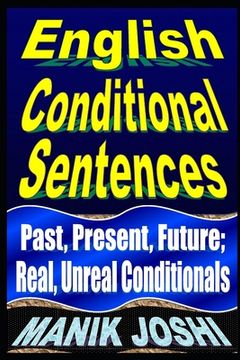Synopsis "English Conditional Sentences: Past, Present, Future; Real, Unreal Conditionals"
"Conditional sentences" express factual implications, or hypothetical situations and their consequences. There are two clauses in conditional sentences: Dependent clause: Expresses the condition. Main clause: Expresses the consequence. This book covers the following topics: What are "Conditional Sentences"? --- Present Real Conditional Sentences --- Present Unreal Conditional Sentences --- Past Real Conditional Sentences --- Past Unreal Conditional Sentences --- Future Real Conditional Sentences --- Future Unreal Conditional Sentences --- Continuous Forms of Conditional Sentences --- Mixed Conditional Sentences --- 'Were To' - Conditional Sentences --- 'Special Force' - Conditional Sentences --- 'Wish'- Conditional Sentences --- 'Miscellaneous' - Conditional Sentences --- Conditional Sentences: Exercise - 1 --- Conditional Sentences: Exercise - 2 --- Summary ----- Present Real Conditional Sentences- The Present Real Conditional Is Used To Talk About What You Normally Do In Real-Life Situations. STRUCTURE - [First Part - If / When ] Subject + Present Verb..., Second Part - Simple Present] OR [First Part - Simple Present, Second Part - If / When ] Subject + Present Verb...] - Whether Use "If" OR "When"? "If" implies - things don't happen regularly. "When" implies - things happen regularly. If you eat too much fast food, it makes you overweight. Or [It makes you overweight if you eat too much fast food.] If you put salt on salad, they taste nicer. Or [They taste nicer if you put salt on salad.] When I have free time, I often sit in the library. [Regularly] Or [I often sit in the library when I have free time.] MORE EXAMPLES: [First Part - If / When ] Subject + Present Verb..., Second Part - Simple Present] If I move to school, I never take my mobile. If you want to be a super-achiever, first recognize your own capabilities. If it melts, it raises the sea level. If something bad happens anywhere, it is natural to be sad. If you heat water, it boils. If the office closes early, we definitely go to the library. If you need help, call me. If I don't come on time, you are supposed to leave the office. If you feel sleepy, just go to bed. If that isn't absolute verification, I don't know what is. If the contractors fail to achieve the target within the specified period, they are liable to pay damages. If you don't get the first good, be content with the second good. [Note: Use of Imperative Sentence] If you are working for something with convictions, you are satisfied. If proper punishment is not awarded to the accused, the faith of the society is shaken in the legal system of the country. [Note: Use of passive voice - is ] awarded, and is + shaken] If uranium is bombarded with a neutron, it absorbs some. If a Swedish govt. is interested in such a deal at all, Sweden can negotiate for itself a better deal. If a person is abused repeatedly then that person has the right to object and the right to argue also. If my statement has pained someone then I regret it. If they have done something wrong that doesn't mean I have also done something wrong. If the refugee cannot afford to pay, she may be refused access to the hospital or have her refugee card confiscated. [First Part - Simple Present, Second Part - If / When ] Subject + Present Verb...] I have come to bother you if you don't mind. We don't even know if any person by that name exists. Their wages are cut if they do not report for duty on time. You learn a language better if you visit the country where it is spoken. Agency works under pressure if one goes by what the ex-Director says. I apologize if at all the article hurt anyone. Power companies can hike the tariffs if the cost of imported coal rises. Hang me if I am guilty. I meet him if I go there. Butter dissolves if you leave it in sun. Plants die if you don't water them.

